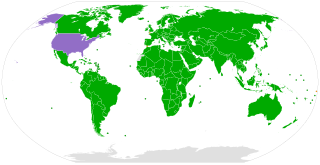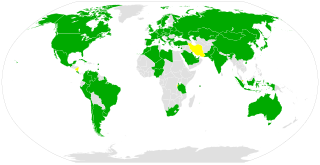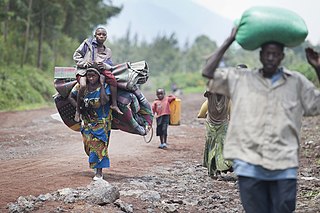
Basel Convention, is an international treaty that was designed to reduce the movements of hazardous waste between nations, and specifically to prevent transfer of hazardous waste from developed to less developed countries (LDCs). It does not, however, address the movement of radioactive waste. The convention is also intended to minimize the rate and toxicity of wastes generated, to ensure their environmentally sound management as closely as possible to the source of generation, and to assist LDCs in environmentally sound management of the hazardous and other wastes they generate.

The Kyoto Protocol was an international treaty which extended the 1992 United Nations Framework Convention on Climate Change (UNFCCC) that commits state parties to reduce greenhouse gas emissions, based on the scientific consensus that (part one) global warming is occurring and (part two) that human-made CO2 emissions are driving it. The Kyoto Protocol was adopted in Kyoto, Japan, on 11 December 1997 and entered into force on 16 February 2005. There were 192 parties (Canada withdrew from the protocol, effective December 2012) to the Protocol in 2020.
The United Nations Framework Convention on Climate Change (UNFCCC) established an international environmental treaty to combat "dangerous human interference with the climate system", in part by stabilizing greenhouse gas concentrations in the atmosphere. It was signed by 154 states at the United Nations Conference on Environment and Development (UNCED), informally known as the Earth Summit, held in Rio de Janeiro from 3 to 14 June 1992. It established a Secretariat headquartered in Bonn and entered into force on 21 March 1994. The treaty called for ongoing scientific research and regular meetings, negotiations, and future policy agreements designed to allow ecosystems to adapt naturally to climate change, to ensure that food production is not threatened and to enable economic development to proceed in a sustainable manner.

The United Nations Convention on the Rights of the Child is an international human rights treaty which sets out the civil, political, economic, social, health and cultural rights of children. The Convention defines a child as any human being under the age of eighteen, unless the age of majority is attained earlier under national legislation.
Arms control is a term for international restrictions upon the development, production, stockpiling, proliferation and usage of small arms, conventional weapons, and weapons of mass destruction. Arms control is typically exercised through the use of diplomacy which seeks to impose such limitations upon consenting participants through international treaties and agreements, although it may also comprise efforts by a nation or group of nations to enforce limitations upon a non-consenting country.
The International Treaty on Plant Genetic Resources for Food and Agriculture, is a comprehensive international agreement in harmony with the Convention on Biological Diversity, which aims at guaranteeing food security through the conservation, exchange and sustainable use of the world's plant genetic resources for food and agriculture (PGRFA), the fair and equitable benefit sharing arising from its use, as well as the recognition of farmers' rights. It was signed in 2001 in Madrid, and entered into force on 29 June 2004.
Ratification is a principal's approval of an act of its agent that lacked the authority to bind the principal legally. Ratification defines the international act in which a state indicates its consent to be bound to a treaty if the parties intended to show their consent by such an act. In the case of bilateral treaties, ratification is usually accomplished by exchanging the requisite instruments, and in the case of multilateral treaties, the usual procedure is for the depositary to collect the ratifications of all states, keeping all parties informed of the situation.

The Convention on the Elimination of all Forms of Discrimination Against Women (CEDAW) is an international treaty adopted in 1979 by the United Nations General Assembly. Described as an international bill of rights for women, it was instituted on 3 September 1981 and has been ratified by 189 states. Over fifty countries that have ratified the Convention have done so subject to certain declarations, reservations, and objections, including 38 countries who rejected the enforcement article 29, which addresses means of settlement for disputes concerning the interpretation or application of the Convention. Australia's declaration noted the limitations on central government power resulting from its federal constitutional system. The United States and Palau have signed, but not ratified the treaty. The Holy See, Iran, Somalia, Sudan, and Tonga are not signatories to CEDAW.
The International Grains Council (IGC) is an intergovernmental organization which oversees the Grains Trade Convention and seeks to promote cooperation in the global grain trade. It’s tasked with enhancing market stability and world food security through providing impartial analysis on supply and demand fundamentals in the grains and oilseed sectors and improving transparency through regular reporting on market and policy developments.

The states parties to the Rome Statute of the International Criminal Court are those sovereign states that have ratified, or have otherwise become party to, the Rome Statute of the International Criminal Court. The Rome Statute is the treaty that established the International Criminal Court, an international court that has jurisdiction over certain international crimes, including genocide, crimes against humanity, and war crimes that are committed by nationals of states parties or within the territory of states parties. States parties are legally obligated to co-operate with the Court when it requires, such as in arresting and transferring indicted persons or providing access to evidence and witnesses. States parties are entitled to participate and vote in proceedings of the Assembly of States Parties, which is the Court's governing body. Such proceedings include the election of such officials as judges and the Prosecutor, the approval of the Court's budget, and the adoption of amendments to the Rome Statute.

The Cape Town Convention on International Interests in Mobile Equipment, or Cape Town Treaty is an international treaty intended to standardize transactions involving movable property. The treaty creates international standards for registration of contracts of sale, security interests (liens), leases and conditional sales contracts, and various legal remedies for default in financing agreements, including repossession and the effect of particular states' bankruptcy laws.

The Convention on Registration of Objects Launched into Outer Space was adopted by the United Nations General Assembly in 1974 and went into force in 1976. As of July 2021, it has been ratified by 71 states.

The Convention on the Rights of Persons with Disabilities is an international human rights treaty of the United Nations intended to protect the rights and dignity of persons with disabilities. Parties to the Convention are required to promote, protect, and ensure the full enjoyment of human rights by persons with disabilities and ensure that persons with disabilities enjoy full equality under the law. The Convention serves as a major catalyst in the global disability rights movement enabling a shift from viewing persons with disabilities as objects of charity, medical treatment and social protection towards viewing them as full and equal members of society, with human rights. The Convention was the first U.N. human rights treaty of the twenty-first century.

The Kampala Convention is a treaty of the African Union (AU) that addresses internal displacement caused by armed conflict, natural disasters and large-scale development projects in Africa.
The Convention on the Protection and Use of Transboundary Watercourses and International Lakes, also known as the Water Convention, is an international environmental agreement and one of five UNECE's negotiated environmental treaties. The purpose of this Convention is to improve national attempts and measures for protection and management of transboundary surface waters and groundwaters. On the international level, Parties are obliged to cooperate and create joint bodies. The Convention includes provisions on: monitoring, research, development, consultations, warning and alarm systems, mutual assistance and access as well as exchange of information.

The United Nations Climate Change Conferences are yearly conferences held in the framework of the United Nations Framework Convention on Climate Change (UNFCCC). They serve as the formal meeting of the UNFCCC parties to assess progress in dealing with climate change, and beginning in the mid-1990s, to negotiate the Kyoto Protocol to establish legally binding obligations for developed countries to reduce their greenhouse gas emissions. Starting in 2005 the conferences have also served as the "Conference of the Parties Serving as the Meeting of Parties to the Kyoto Protocol" (CMP); also parties to the convention that are not parties to the protocol can participate in protocol-related meetings as observers. From 2011 to 2015 the meetings were used to negotiate the Paris Agreement as part of the Durban platform, which created a general path towards climate action. Any final text of a COP must be agreed by consensus.










